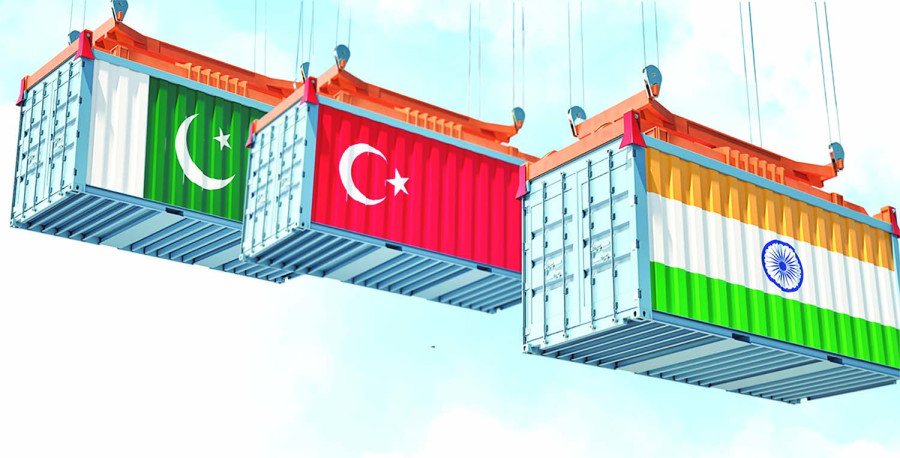Columns
Turkey’s overreach in South Asia
It will be interesting to see if Turkey will do any balancing between India and Pakistan.
Harsh Pandey & Abhishek Khajuria
The dastardly attack on tourists in Pahalgam in April led to a sharp rise in tensions between India and Pakistan, the two nuclear-armed neighbours. India retaliated to the attack by launching ‘Operation Sindoor’, striking at alleged terrorist bases deep inside the Pakistani territory. Pakistan launched a drone attack on all the border Indian states, namely, Jammu and Kashmir (J&K), Punjab, Rajasthan and Gujarat. Swarms of drones came from across the border, which were successfully thwarted by the Indian air defence systems.
In the press briefing by India’s Ministry of External Affairs (MEA), it was reported that the drones used to attack India were the Songar drones manufactured by the Turkish company Asisguard. This statement brought into sharp focus the active role Turkey has played in the recent India-Pakistan crisis. Over the years, Turkey has supported the Pakistani narrative on J&K and has continued to back it in international fora, often drawing sharp criticism from India.
However, in the past month or so, it has become clear that Turkey is also actively providing military assistance to Pakistan. This came on the back of the Turkish warship TCG Büyükada (F-512) docking at the Karachi port on May 4, and a week before that, the visit of a Turkish C-130 transport aircraft. Although the former was referred to as a “goodwill visit”, observers speculated that these military assets most likely carried military supplies. Hence, Turkey’s role in the recent state of affairs between India and Pakistan necessitates an in-depth study of the Turkey-Pakistan relationship and how it has come to affect India.
The roots of the relationship between modern-day Turkey and Pakistan took hold even before today’s Republic of Turkiye and the Islamic Republic of Pakistan came into existence. During the tail-end of the First World War, with the launch of the Khilafat movement, Indian Muslims (including those living in present-day Pakistan) sent financial and material support to the Ottoman Empire, which was on the verge of being dissolved by the victorious powers. This generated goodwill among the Turks, which carried on when Pakistan came into existence in 1947, and Turkey became one of the first countries to recognise it.
On April 2, 1954, both countries signed a treaty of friendship and cooperation. In the 1950s, they shared membership in the Baghdad Pact, which later became the Central Treaty Organisation (CENTO), sowing the seeds of military collaboration. Turkey, which earlier purchased weapons from Pakistan, is a major seller today. In the Indo-Pak wars of 1965 and 1971, Turkey steadfastly supported Pakistan, both diplomatically and logistically. In 1974, in the Organisation of Islamic Cooperation (OIC), Turkey supported Pakistan’s position on Jammu and Kashmir, and the Turkish ambassador to Pakistan also spent a week in Muzaffarabad. The US War on Terror also strategically aligned the two countries, and military cooperation has increased in recent years.
In the aftermath of the failed coup in Turkey in 2016, Pakistan was one of the first countries to voice support for the Erdoğan government. Later, it even shut down establishments associated with the Gülen movement at the insistence of Turkey. In 2018, both countries signed an agreement under which Turkey was to sell 30 T-129 ATAK helicopters to Pakistan, but the deal could not take off due to US export licensing restrictions. Turkey has also built MILGEM (a national warship programme of Turkey)-class corvettes for the Pakistani Navy. Pakistan’s dependence on Turkey has increased significantly, as Turkey has become Pakistan’s second-largest arms supplier after China.
The anti-colonial struggle against the British Empire shaped this relationship till the partition of British India. Due to geopolitical and ideological realities of the day, there has been a convergence between Pakistan and Turkey, as Pakistan has been understood as the inheritor of this relationship shaped during British India.
Post-independence, India-Pakistan tensions shaped much of Turkey’s relationship with India, where it openly supported Pakistan on the Kashmir issue. There was a bilateral effort to renew the relations as Turkish Prime Minister Turgut Özal visited New Delhi in 1986, followed by a visit of Indian Prime Minister Rajiv Gandhi in 1988. However, India was grappling with cross-border insurgency during the 90s in Kashmir, and Ankara’s support to Pakistan made the relationship cold. The current President of Turkey, Recep Tayyip Erdoğan, has been in power since 2002. He adopted the doctrine of ‘strategic depth’ given by former Prime Minister Ahmet Davutoglu, where the present regime can leverage Turkish historical ties with other states.
India has developed as a greater avenue for economic investments due to its impressive growth. It was evident when Erdoğan visited India in 2017 with a business delegation of 100 people. Earlier in 2008, he also proposed an India-Turkey Free Trade Agreement, which could not be materialised. However, India provides a lucrative business opportunity for Turkish companies and investors, as many of them are working in India. There has been a trade of around $11 billion between Turkey and India, according to financial data of 2023-24. India also initiated ‘Operation Dost’ in 2023 when Turkey and Syria faced one of the deadliest earthquakes in recent decades.
Keeping in mind Turkey’s differentiated engagement in relation to India and Pakistan in South Asia, we must also take into account the broader geopolitics of the Middle East in the region. Erdoğan’s historical revisionism ventures into an idea where the current Middle Eastern geopolitics is deeply intertwined. While the three power centres of the Middle East—notably Saudi Arabia, Iran and Israel—are trying to shape the region through their interventions, Turkey also wants to engage with the region with its Ottoman legacy, where Pakistan is a key ally.
During Pakistan’s nuclear weapons development programme, Islamabad understood that through its nuclear arsenal, it would emerge as the ‘guardian’ of Middle Eastern oil empires. There have been reports that Saudis have shown this interest in Pakistan earlier. However, Pakistan’s leverage significantly dwindled because the US became the sole security guarantor for the Middle Eastern monarchies with its Fifth Fleet.
The current Turkey-Pakistan nexus is also the result of this geopolitical ramification, where most Middle Eastern powers would not want to share their sphere of influence with Turkey. Most of them see Pakistan as a liability and choose to de-hyphenate its relationship with India and maintain economic and strategic ties with the latter. Collaboration between India, Israel, the United Arab Emirates (UAE) and the US, known as I2U2 and the India–Middle East–Europe Economic Corridor (IMEC), is an example. The government of India, interested in economic engagements with Turkey, also tightened its grip on Turkish businesses. It will be interesting to see if Turkey will do any balancing or trust in its Pakistan gambit while waiting for some return in the future.




 21.12°C Kathmandu
21.12°C Kathmandu
















